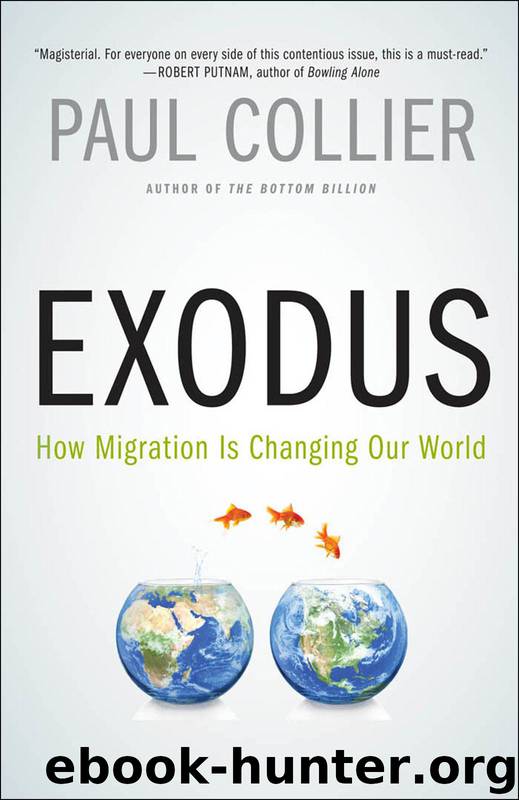Exodus: How Migration is Changing Our World by Collier Paul

Author:Collier, Paul [Collier, Paul]
Language: eng
Format: epub
Publisher: Oxford University Press, USA
Published: 2013-08-01T00:00:00+00:00
Please Let Us In
The need to finance the investment in migration is only one of the impediments to it. People might want to migrate and be able to finance it and yet be unable to do so because they face immigration restrictions in their preferred host country. Indeed, as discussed in chapter 2, in response to accelerating immigration, all high-income countries now impose immigration restrictions of some form or another. Faced with restrictions, the potential migrant has three options other than to remain at home. He could try to acquire the characteristics that enable him to satisfy the restrictions. He could try to cheat: getting the permission to migrate despite lacking the necessary characteristics. Most desperately, he could try to evade the physical barriers that impede the immigration of those who do not have permission to migrate. Put yourself in the place of a would-be migrant pondering these options.
The restrictions that host countries impose on migrants vary considerably. Most impose some minimum requirements for education, and some add professional skills. This is because indigenous populations in host countries gain more from a highly educated migrant than from an uneducated one. For one thing, the distributional consequences are also likely to be better, with immigrants less likely to be in open competition with the lowest earning indigenous workers. Australia and Canada pioneered educational entry requirements, probably because they are so obviously immigrant societies that the details of policy toward immigration cannot be dodged by the mainstream political parties. Migration policy has been actively debated and so is coherently designed to be in the interest of the indigenous population. Reflecting this, Australian and Canadian educational requirements are the most demanding. America is next: perhaps again, because immigration is in America’s DNA, policy debate has been somewhat more open. Europe has the least educationally demanding entry requirements. This surely reflects the absence of reasoned policy debate on the issue, as discussed in chapter 1. European immigration requirements are now rising, but this may have been driven more by the need for gestures than by a well-reasoned case.
An unintended effect of these restrictions is to increase the demand for education in poor countries: educational attainment is the passport out. Young people may not even know whether they will want to migrate, but education is a form of insurance. This is particularly important for ethnic minorities that might face discrimination in their country of origin: education provides protection. An instance of this behavior is the Indian ethnic minority in Fiji. After a long period of peaceful coexistence, a coup by indigenous army officers led to a period of anti-Indian rhetoric and discrimination that drove many people to leave. Since then, even though the interim government lost power and policy returned to normal, Indians have invested heavily in education so as to be able to gain entry to Australia if necessary. As a result, the Indian ethnic group has become significantly better educated than the rest of the indigenous population. Educational responses to the opportunity to
Download
This site does not store any files on its server. We only index and link to content provided by other sites. Please contact the content providers to delete copyright contents if any and email us, we'll remove relevant links or contents immediately.
50 Economics Classics by Tom Butler-Bowdon(2571)
Six Billion Shoppers by Porter Erisman(2303)
Why Nations Fail: The Origins of Power, Prosperity, and Poverty by Daron Acemoglu & James Robinson(2297)
No Time to Say Goodbye(2117)
Red Notice by Bill Browder(2082)
Currency Trading For Dummies by Brian Dolan(1929)
The Economist [T6, 22 Thg9 2017] by The Economist(1927)
Thank You for Being Late by Thomas L. Friedman(1772)
Bitcoin: The Ultimate Guide to the World of Bitcoin, Bitcoin Mining, Bitcoin Investing, Blockchain Technology, Cryptocurrency (2nd Edition) by Ikuya Takashima(1699)
Amazon FBA: Amazon FBA Blackbook: Everything You Need To Know to Start Your Amazon Business Empire (Amazon Empire, FBA Mastery) by John Fisher(1575)
Coffee: From Bean to Barista by Robert W. Thurston(1547)
The Future Is Asian by Parag Khanna(1484)
The Great Economists by Linda Yueh(1454)
How Money Got Free: Bitcoin and the Fight for the Future of Finance by Brian Patrick Eha(1425)
Grave New World by Stephen D. King(1421)
Pocket World in Figures 2018 by The Economist(1420)
Capitalism Without Capital: The Rise of the Intangible Economy by Jonathan Haskel(1401)
The Sex Business by Economist(1386)
Cultural Intelligence by David C. Thomas(1289)
